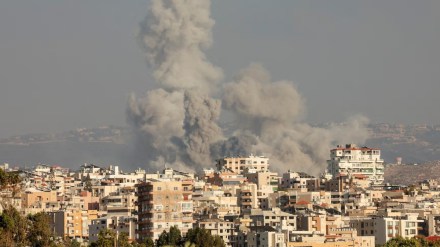A wave of air raids struck Beirut’s southern suburbs early on Saturday as Israel intensified its attacks on Hezbollah, following a significant strike on Iran-backed group’s command centre, reportedly targeting leader Hassan Nasrallah.
Reuters witnesses reported over 20 airstrikes before dawn on Saturday. Thousands of Lebanese, fleeing their homes in the southern suburbs, gathered in squares, parks and sidewalks in downtown Beirut and along the coastline. “They want to destroy Dahiye; they want to destroy all of us,” said Sari, a man in his 30s, referring to the suburb he had evacuated.
Israel’s military reported that approximately 10 projectiles were launched from Lebanon into Israeli territory, with some intercepted. The military did not specify the projectiles, which were detected after sirens activated in the Upper Galilee area.
Escalation of conflict
The airstrikes marked an unprecedented five hours of continuous bombardment, following Friday’s powerful attacks— the most significant from Israel on Beirut amid nearly a year of conflict with Hezbollah. This escalation raised concerns that the conflict could spiral out of control, potentially involving Iran and the United States.
While there was no immediate confirmation regarding Nasrallah’s status after the heavy strikes, a source close to Hezbollah indicated he was unreachable. The Lebanese group has not issued any statements. An Israeli official confirmed that top Hezbollah commanders were the intended targets but did not clarify whether Nasrallah was specifically targeted.
Rising death toll
In the hours leading up to the latest strikes, Israeli Prime Minister Benjamin Netanyahu asserted at the United Nations that Israel had the right to continue its military campaign. Lebanese health authorities reported six deaths and 91 injuries from Friday’s attack—the fourth on Hezbollah-controlled southern suburbs within a week and the heaviest since the 2006 war. The overall casualty toll over the past week has surpassed 700.
Hezbollah’s al-Manar television reported the destruction of seven buildings, while security sources indicated the target was an area where top Hezbollah officials typically operate. Following the strikes, the Israeli military issued evacuation orders for parts of Beirut’s southern suburbs, claiming to target missile launchers and weapons storage sites located under civilian structures. Hezbollah denied the presence of weapons in the affected buildings.
Growing displacement crisis
Around 100,000 people in Lebanon have been displaced this week, bringing the total number of uprooted individuals to over 200,000. Alaa al-Din Saeed, a resident of a targeted neighbourhood, described his family’s frantic escape as they attempted to flee amid chaos.
Hezbollah has responded to the escalation with hundreds of rockets aimed at Israel, including attacks on Tel Aviv and the northern city of Safed, where a woman suffered minor injuries. Israel’s air defence systems have so far minimised damage from these attacks.
International concerns and diplomatic efforts
Iran condemned Israel’s actions, stating that Friday’s attack crossed “red lines” and accused Israel of using US.-made “bunker-busting” bombs. US. Defense Secretary Lloyd Austin noted that Washington was not informed of the strike beforehand. Amidst escalating tensions, expressions of concern emerged at the UN., with France and the US. proposing a 21-day ceasefire.
Hezbollah’s missile barrage against Israel marks the latest chapter in a decades-long conflict, reignited following the October 7 attack on Israel by Hamas. As tensions continue to rise, the urgency for diplomatic solutions becomes increasingly apparent.
(With inputs from Reuters)
